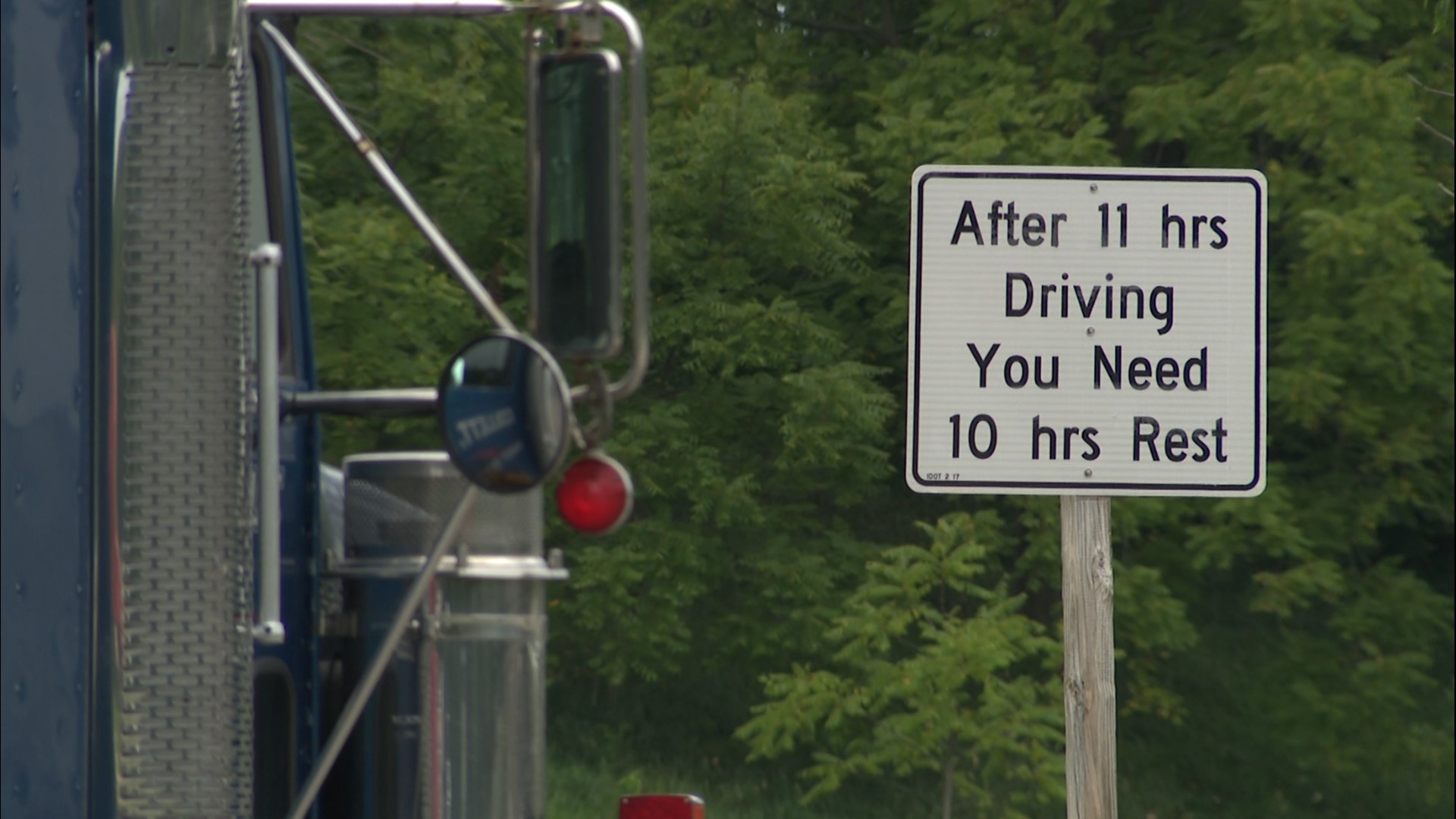HIGHLAND, Illinois — Over the last month, our I-Team investigated issues that federal officials say may have contributed to the recent deadly Greyhound bus crash in Highland, Illinois. The National Transportation Safety Board said they are still in the early stages of its investigation, and that it could take up to two years to determine a cause.
“We are particularly interested in issues relating to rest areas, safety, bus occupant protection and potential driver fatigue and medical fitness," said National Transportation Safety Board member Tom Chapman in a July 13 media briefing.
It was July 12 at 1:48 in the morning: A Greyhound bus heading to St. Louis crashed into tractor-trailers parked along an exit ramp. Three people died. Many more were injured. Since then, our I-Team has come to the site again and again to talk with those who drive commercial vehicles every day, to understand their biggest struggles on the road. A top one: sleepy driving. It’s one of many factors federal officials are now looking into.
What drivers say about fatigue
“How big of a problem is lack of sleep for bus and truck drivers?” asked the I-Team's Paula Vasan.
“Very dangerous," said Kevin Collett, a truck driver. “They need to be able to pull over and take another nap if they have to.”
Collett said that’s not always possible.
“The drivers need to have more input into what they will and won't do because a lot of these companies want to try and drive the truck from behind their desk," Collett said.
It’s why he paid $40,000 for his own truck, to operate his own business.
“That's why I have my own authority," he said.
He tells our I-Team he would not work for a bus or truck company. He believes they too often push drivers to exhaustion … even though federal regulations say commercial drivers can’t drive more than up to 11 hours after 10 hours off. But Collett said the rules are not always followed.
And companies often face violations for what are called “hours of service,” or how long a driver can be on the road before getting time to rest. A new report from an industry inspection association, the Commercial Vehicle Safety Alliance, shows it’s a top driver violation.
Collett tells us it’s because companies are pushed to maximize profit, with middlemen making promises that are hard to keep.
“They're the ones pressuring. You know, you make a promise to the customer. 'Hey, I'll move that for you for $1,000 and I'll get down there in four hours,' if the driver hasn't slept," he said.
And then sleep becomes harder.
“You get all hopped up on caffeine and 5-hour Energy and you don't sleep," he said.
We got in touch with the Amalgamated Transit Union, which represents bus drivers. Karen Miller, a Memphis-based union representative, said it’s the responsibility of drivers to get their rest.
The effect of obstructive sleep apnea
Houston-based personal injury attorney Ryan Zehl with Zehl & Associates said it’s putting everyone on the road in danger. He represents people who’ve been injured by bus and truck drivers.
“And these drivers are chronically fatigued because what's happening is they're not breathing properly in the middle of the night," said Zehl.
A common problem he sees: Obstructive sleep apnea. It’s a serious sleep disorder that happens when breathing starts and stops throughout the night, leading to limited oxygen and lack of sleep. Research by the Federal Motor Carrier Safety Administration shows about 1 in 3 commercial truck drivers have the condition.
“And so they're sleep deprived," said Zehl.
Lack of parking
There are other reasons for sleep deprivation. Drivers tell us scarce parking only adds to sleepiness behind the wheel. We discovered many drivers are forced to break the law, parking along exit ramps to get rest.
“Have you ever fallen asleep or have you ever fallen asleep at the wheel by accident?” asked Vasan.
“I was looking for somewhere to park and there was nowhere. I could feel the fatigue set in," said Brent France, a truck driver. “And I blink my eyes and I woke up and. I was probably, I don't know, I was probably 100-feet down the road ... it scared me.”
“Would you say lack of parking is impacting how rested drivers can be?” Vasan asked another truck driver.
“Yeah, it can be," said truck driver Charmaine Harris. “I'm going to keep going further out until I find somewhere with adequate parking where I feel safe and secure for me to go lay down and rest overnight.”
The roughly dozen drivers we interviewed on and off-camera as part of this investigation tell us lack of parking spots and driver fatigue have only gotten worse over the years … and often, they don’t get attention until tragedy strikes.
We reached out to eight of the biggest commercial bus and truck companies in the U.S. We asked about how they’re responding to drivers being concerned about sleepiness on the road. We’re waiting to hear back.
And again, officials have not yet determined what caused the Greyhound bus crash in Highland, Illinois. Our I-Team will continue pressing for answers.
Reaction from bus and truck companies
We asked some of the largest bus and truck companies in the U.S. about how they’re responding to industry concerns regarding lack of sleep among drivers.
Greyhound spokesperson Mike Ogulnick told us in an email: "Our hearts go out to all those impacted by the recent incident. Greyhound continues to work with authorities and those affected to assist in any way possible. The safety and care of our customers and employees remains our top priority."
RESOURCES

